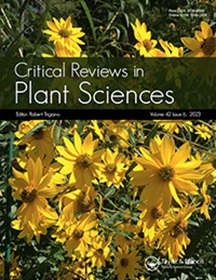利用聚集规则间隔短回文重复序列-组织特异性敲除(CRISPR-TSKO)技术探索易感基因增强宿主抗性
IF 6
2区 生物学
Q1 PLANT SCIENCES
引用次数: 14
摘要
易感基因(S)是那些促进病原菌侵染和致病的植物基因。这些基因功能的丧失主要阻断了入侵病原体的生长和发育,从而使植物具有抗性。s基因靶向抗性可以在植物中产生持久的免疫。因为,基于S基因的抗性源于病原体在宿主中生存所需的宿主因子的失活。为了绕过基于S基因的抗性,寄生病原体必须进化并发展与其宿主因子自然提供的相同或类似的功能,这要困难得多,甚至可能是不可能的。然而,鉴定和靶向适当的S基因以获得对特定疾病的抗性是至关重要的,因为S基因在许多情况下可能是病原体特异性的。聚集规则间隔短回文重复序列(CRISPR)技术在操纵植物S基因方面显示出巨大的潜力。CRISPR-TSKO(基于crispr的组织特异性敲除)工具包可以提供对单个基因在组织和发育阶段特异性方式中的确切功能的理解,同时也可以产生可遗传的突变等位基因。本文综述了CRISPR-TSKO介导的组织特异性基因敲低以增强宿主抗性的候选S基因。本文章由计算机程序翻译,如有差异,请以英文原文为准。
Exploration of Susceptible Genes with Clustered Regularly Interspaced Short Palindromic Repeats–Tissue-Specific Knockout (CRISPR-TSKO) to Enhance Host Resistance
Abstract Susceptible (S) genes are those plant genes that facilitate pathogen infection and disease. The loss of function of these genes primarily interrupts the growth and development of invading pathogens and thus makes plants resistant. The S-gene-targeted resistance may produce durable immunity in plants. Because, S gene-based resistance is derived from the inactivation of a host factor required for the survival of a pathogen in the host. To bypass the S gene-based resistance, a parasitic pathogen must evolve and develop the same or similar functions provided naturally by its host factors, which is far more difficult or even may be impossible. However, it is critical to identify and target the appropriate S gene(s) aiming to gain resistant capacity against a particular disease, because S genes may be pathogen-specific in many cases. The clustered regularly interspaced short palindromic repeats (CRISPR) technology has shown great potential in manipulating S genes in plants. The CRISPR-TSKO (CRISPR-based tissue-specific knock-out) tool kit can provide an understanding of the exact function of an individual gene in a tissue and developmental stage-specific manner while also producing a heritable mutant allele. In this review, candidate S genes have been summarized for CRISPR-TSKO mediated tissue-specific gene knockdown to enhance host resistance.
求助全文
通过发布文献求助,成功后即可免费获取论文全文。
去求助
来源期刊
CiteScore
12.90
自引率
1.40%
发文量
15
审稿时长
>12 weeks
期刊介绍:
Critical Reviews in Plant Sciences focuses on presenting in-depth and up-to-date reviews of timely and/or cutting-edge subjects in the broad discipline of plant science, ranging from molecular biology/biochemistry through the areas of cell biology, plant pathology and physiology, genetics, classical botany, and ecology, to practical agricultural applications. Articles in the journal provide an up-to-date literature base for researchers and students, pointing the way towards future research needs. The journal is also a significant source of credible, objective information to aid decision makers at all levels.

 求助内容:
求助内容: 应助结果提醒方式:
应助结果提醒方式:


